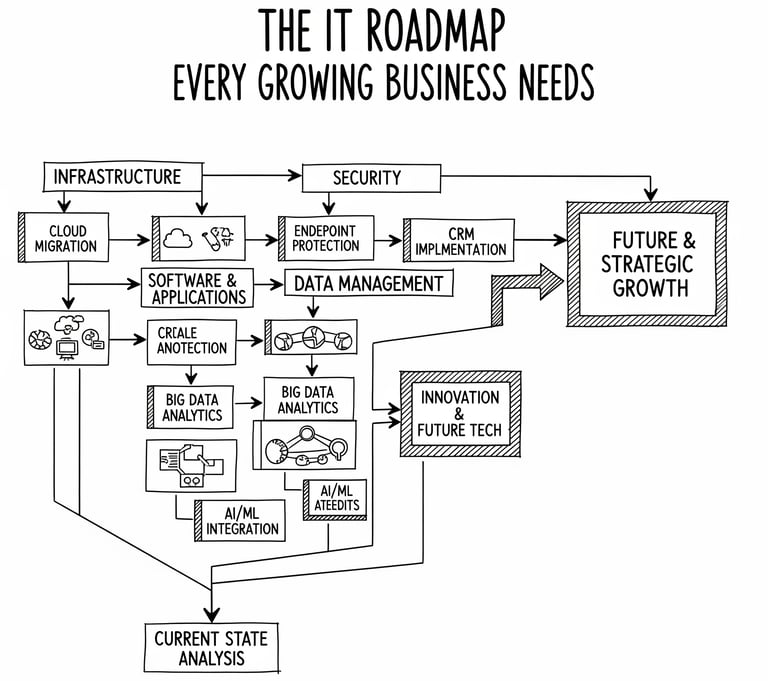The IT Roadmap Every Growing Business Needs
IT Roadmap for SMEs
Rahul Singh
11/4/2024


Introduction
As small and medium-sized businesses grow, their technology needs become increasingly complex. Without a clear IT strategy, organizations may find themselves reacting to technical issues rather than leveraging technology as a competitive advantage. An IT roadmap provides the structure needed to align technology investments with business objectives.
What is an IT Roadmap?
An IT roadmap is a strategic document that outlines your technology priorities over time.
It serves as:
A communication tool for stakeholders
A planning guide for implementation
A measurement framework for success
For SMEs, this might include:
Current state assessment
Short-term fixes (next 0-6 months)
Mid-term projects (6-18 months)
Long-term vision (18+ months)
Why is it Crucial for SMEs?
Many small business owners focus on immediate operational concerns while leaving technology strategy as an afterthought. However, this approach can lead to:
Inefficient use of resources
Disrupted operations during unplanned upgrades
Difficulty scaling with growth
Security vulnerabilities
A well-planned IT roadmap helps you:
Anticipate and plan for upcoming needs rather than reacting to crises
Allocate budgets more effectively across multiple initiatives
Ensure technology investments align with business goals
Manage risks associated with technological change
How to Create Your IT Roadmap
Assess Current State
Inventory all existing hardware, software, and licenses
Identify pain points and bottlenecks in current operations
Evaluate security posture and compliance needs
Define Business Objectives
What are your 3-year business goals?
How will technology help you achieve these?
Are there specific KPIs tied to technology improvements?
Prioritize Initiatives
Quick wins (immediate fixes that provide value)
Foundation projects (necessary infrastructure upgrades)
Transformation initiatives (long-term strategic projects)
Develop Timeline and Budget
Map out implementation phases
Estimate costs for each phase
Identify dependencies between projects
Plan for Continuous Review
Schedule regular reviews to assess progress
Build in flexibility for changing business needs
Document lessons learned from implementations
Where to Start?
For SMEs with limited internal IT resources, we recommend:
Conducting an initial technology assessment with a trusted advisor
Focusing on immediate pain points while planning for future growth
Investing in scalable solutions that can grow with your business
Creating a culture of continuous improvement around technology usage
Conclusion
An effective IT roadmap isn't just about technology—it's about aligning your technology investments with your business strategy to drive growth and efficiency. For small businesses, this means focusing on immediate needs while planning for future scalability.
At 9 Auras Tech, we specialize in helping SMEs develop practical IT strategies that balance immediate requirements with long-term goals. Let us help you create a roadmap that supports your business success.
9 Auras Tech
Innovative IT Solutions For A Brighter Future
Contact
info@9aurastech.com
+61 0470242024
9aurastech © 2025. All rights reserved.
